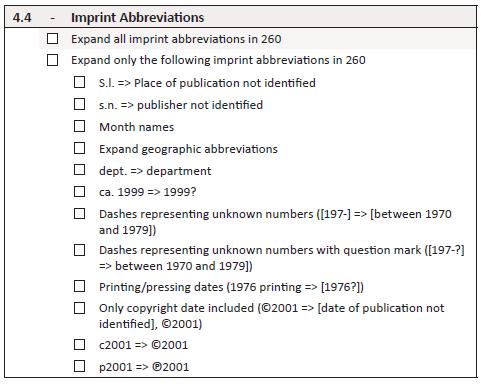Difference between revisions of "RDA 4.4"
(→STEP 4.4 : IMPRINT ABBREVIATIONS) |
(→STEP 4.4 : IMPRINT ABBREVIATIONS) |
||
| Line 1: | Line 1: | ||
==STEP 4.4 : IMPRINT ABBREVIATIONS== | ==STEP 4.4 : IMPRINT ABBREVIATIONS== | ||
| − | + | [[File:RDA_4.4.jpg]] | |
===imprint abbreviations=== | ===imprint abbreviations=== | ||
Several abbreviations in the imprint field (260) in AACR2 are not valid with RDA. | Several abbreviations in the imprint field (260) in AACR2 are not valid with RDA. | ||
Revision as of 12:23, 9 January 2012
Contents
STEP 4.4 : IMPRINT ABBREVIATIONS
imprint abbreviations
Several abbreviations in the imprint field (260) in AACR2 are not valid with RDA. Here are several options for expanding these imprint abbreviations.
latin abbreviations
AACR2 used latin abbreviations for the 260 $a and 260 $b when either the place of publication or publisher name were not available. With RDA, new phrases have replaced these Latin abbreviations.
original field:
260 $a [S.l. : $b s.n.], $c 1963.
updated field:
260 $a [Place of publication not identified] : $b [publisher not identified], $c 1963.
month names
With RDA, names of months of the year are not to be abbreviated in the 260. This rule uses the same month abbreviation table as is used for the X00/X10/ X11/X30 fields (see Step 4.2):
original field:
260 $a Paris : $b Le Robert, $c Jan. 2010.
updated field:
260 $a Paris : $b Le Robert, $c January 2010.
geographic names
Geographic place names (e.g. states, countries, etc.) should no longer be abbreviated. MARS 2.0 uses a list of many different geographic terms and their common abbreviations which will be expanded:
original field:
260 $a Hoboken, N.J. : $b Wiley, $c 2009.
updated field:
260 $a Hoboken, New Jersey : $b Wiley, $c 2009.
department
As with the X10/X11 fields, dept. should no longer be abbreviated in the 260 field; it is to be expanded to department. The Library of Congress is currently keeping department as an abbreviation:
original field:
260 $a Raleigh : $b State Dept. of Archives and History, $c 1954.
updated field:
260 $a Raleigh : $b State Department of Archives and History, $c 1954.
ca.
In the 260 $c and $g, ca. is no longer used to represent circa or approximately. Instead, a question mark ? should be added after the date:
original field:
260 $a London : $b O. Hodgson, $c [ca. 1830]
updated field:
260 $a London : $b O. Hodgson, $c [1830?]
dashes representing unknown numbers
With AACR2, a dash could be used to represent an unknown number within a date. In using RDA, the dash is no longer used. A range of dates encompassing the unknown number should now be used.
If there is a question mark included in the date, the question mark should remain at the end of the date range:
original fields:
260 $a New York : $b A. E. Chasmar, $c [188-]
260 $a London : $b J.T. Pickburn, $c [18--?]
updated fields:
260 $a New York : $b A. E. Chasmar, $c [between 1880 and 1889]
260 $a London : $b J.T. Pickburn, $c [between 1800 and 1899?]
printing/pressing/copyright/phonogram
Printing or pressing dates should now be enclosed within square brackets with a question mark at the end of the date.
When either a c or p is the character right before a date, they should be changed for either the copyright symbol © or phonogram symbol ℗.
If only a copyright date is included, RDA dictates that [place of publication not identified] should be added:
original fields:
260 $a New York : $b Alfred A. Knopf, $c 2010 printing.
260 $a Berlin : $b Louis Gerschel, $c c1964.
260 $a New York : $b Anchor Books, $c p2001.
updated fields:
260 $a New York : $b Alfred A. Knopf, $c [2010?]
260 $a Berlin : $b Louis Gerschel, $c [date of publication not identified], ©1964.
260 $a New York : $b Anchor Books, $c ℗2001.
LINKS
1.0 - 2.0 - 3.0 - 4.0 - 5.0 - 6.0 - 7.0
